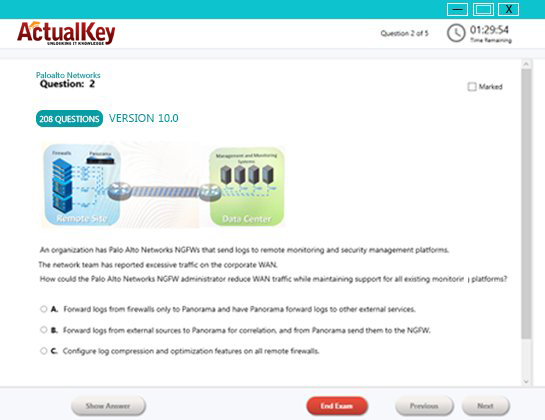Limited Time 30% Discount Offer Use Code - off30
Actualkey Prepration Latest 300-209 : Cisco Implementing Cisco Secure Mobility Solutions Exam (SIMOS) Questions and Answers PDF's, Verified Answers via Experts - Pass Your Exam For Sure and instant Downloads - "Money Back Guarantee".
| Vendor | Cisco |
| Certification | CCNP Security |
| Exam Code | 300-209 |
| Title | Cisco Implementing Cisco Secure Mobility Solutions Exam (SIMOS) |
| No Of Questions | 543 |
| Last Updated | May 17,2024 |
| Product Type | Q & A with Explanation |
| Bundel Pack Included | PDF + Offline / Andriod Testing Engine and Simulator |
300-209 SIMOS
Implementing Cisco Secure Mobility Solutions
Exam Number 300-209 SIMOS
Associated Certifications CCNP Security
Duration 90 minutes (65 - 75 questions)
Available Languages English
Register Pearson VUE
The Implementing Cisco Secure Mobility Solutions (SIMOS) (300-209) exam tests a network security engineer on the variety of Virtual Private Network (VPN) solutions that Cisco has available on the Cisco ASA firewall and Cisco IOS software platforms. This 90-minute exam consists of 65-75 questions and assesses the knowledge necessary to properly implement highly secure remote communications through VPN technology, such as remote access SSL VPN and site-to-site VPN (DMVPN, FlexVPN). Candidates can prepare for this exam by taking the Implementing Cisco Secure Mobility Solutions (SIMOS) course.
Exam Topics
The exam is closed book, and no outside reference materials are allowed. The following topics are general guidelines for the content that is likely to be included on the exam. However, other related topics may also appear on any specific delivery of the exam. In order to better reflect the contents of the exam and for clarity purposes, the guidelines that follow may change at any time without notice.
32% 1.0 Secure Communications
1.1 Site-to-site VPNs on routers and firewalls
1.1.a Describe GETVPN
1.1.b Implement IPsec (with IKEv1 and IKEv2 for both IPV4 & IPV6)
1.1.c Implement DMVPN (hub-Spoke and spoke-spoke on both IPV4 & IPV6)
1.1.d Implement FlexVPN (hub-Spoke on both IPV4 & IPV6) using local AAA
1.2 Implement remote access VPNs
1.2.a Implement AnyConnect IKEv2 VPNs on ASA and routers
1.2.b Implement AnyConnect SSLVPN on ASA and routers
1.2.c Implement clientless SSLVPN on ASA and routers
1.2.d Implement FLEX VPN on routers
38% 2.0 Troubleshooting, Monitoring and Reporting Tools
2.1 Troubleshoot VPN using ASDM & CLI
2.1.a Troubleshoot IPsec
2.1.b Troubleshoot DMVPN
2.1.c Troubleshoot FlexVPN
2.1.d Troubleshoot AnyConnect IKEv2 and SSL VPNs on ASA and routers
2.1.e Troubleshoot clientless SSLVPN on ASA and routers
30% 3.0 Secure Communications Architectures
3.1 Design site-to-site VPN solutions
3.1.a Identify functional components of GETVPN, FlexVPN, DMVPN, and IPsec
3.1.b VPN technology considerations based on functional requirements
3.1.c High availability considerations
3.1.d Identify VPN technology based on configuration output
3.2 Design remote access VPN solutions
3.2.a Identify functional components of FlexVPN, IPsec, and Clientless SSL
3.2.b VPN technology considerations based on functional requirements
3.2.c High availability considerations
3.2.d Identify VPN technology based on configuration output
3.2.e Identify AnyConnect client requirements
3.2.f Clientless SSL browser and client considerations/requirements
3.2.g Identify split tunneling requirements
3.3 Describe encryption, hashing, and Next Generation Encryption (NGE)
3.3.a Compare and contrast Symmetric and asymmetric key algorithms
3.3.b Identify and describe the cryptographic process in VPNs - Diffie-Hellman, IPsec - ESP, AH, IKEv1, IKEv2, hashing algorithms MD5 and SHA, and authentication methods
3.3.c Describe PKI components and protection methods
3.3.d Describe Elliptic Curve Cryptography (ECC)
3.3.e Compare and contrast SSL, DTLS, and TLS
I Got My Success Due To Actualkey 300-209 Bundle Pack Actualkey experts I got passed in the 300-209 exam without any worries at all, these exam material products gave me the reason to relax.
Budi Saptarmat
Yahoo! Got Successfully Through The 300-209 Exam Passing Exam is not a easy thanks to Acutalkey.com for providing me actual 300-209 Cisco Implementing Cisco Secure Mobility Solutions Exam (SIMOS) training with there included the Offline and Android simulators helps me success
Melinda
300-209 Exam Best Preparation I have been preparing for 300-209 Cisco Implementing Cisco Secure Mobility Solutions Exam (SIMOS), I was not sure that I'll be able to pass because of the fact that I am not a good student however;Actualkey.com provided me best and simple exam training pdf's and I passed. I now recommend everyone
Antonio Moreno
Actualkey.com 300-209 Offline Simulator is Best My choice to select Actualkey.com and go for the preparation 300-209 Cisco Implementing Cisco Secure Mobility Solutions Exam (SIMOS), because I got the short way with the easy way
Liliane Meichner
Actualkey.com 300-209 Exam PDF"s passed with in a week 300-209 exam pdf's that's amazing
James Wilson
Cisco - RELATED EXAMS
Implementing Cisco Unified Communications Manager Part 2 (CIPT2 v6.0)
Questions: 174 | May 8, 2024
Implementing Cisco Security Monitoring, Analysis andResponse System
Questions: 49 | May 8, 2024
Cisco Wide Area Application Services for System Engineers exam
Questions: 60 | August 1, 2024
Cisco Data Center Networking Infrastructure Solutions design
Questions: 120 | August 1, 2024
Implementing Cisco Unified Wireless Networking Essentials (IUWNE)
Questions: 203 | July 1, 2024
Associated Certifications: Cisco Storage Networking Support Specialist
Questions: 74 | August 1, 2024
Implementing Cisco Security Monitoring, Analysis, and Response System
Questions: 67 | August 1, 2024
Wide Area Application Services for System Engineers (WAASSE)
Questions: 90 | January 5, 2024
Implementing Advanced Cisco Unified Wireless Security (IAUWS)
Questions: 85 | January 7, 2024
Troubleshooting and Maintaining Cisco IP Switched Networks (TSHOOT)
Questions: 72 | January 7, 2024
Implementing Cisco Unified Communications Voice over IP and QoS v8.0 (CVOICE v8.0)
Questions: 257 | July 1, 2024
Securing Networks with Cisco Routers and Switches (SECURE) v1.0
Questions: 136 | July 1, 2024
Implementing Cisco Unified CommunicationsManager, Part 2 v8.0 (CIPT2 v8.0)
Questions: 215 | July 1, 2024
Introducing Cisco Voice and Unified Communications Administration v8.0
Questions: 300 | May 8, 2024
Integrating Cisco Unified Communications Applications v8.0 (CAPPS v8.0)
Questions: 203 | May 8, 2024
Operational Foundations for Cisco Service Provider Core Networks
Questions: 91 | May 8, 2024
Maintaining Cisco Service Provider VPNs and MPLS Networks (MSPVM)
Questions: 89 | May 8, 2024
Cisco Data Center Unified Computing Support Specialist Qualifier Exam (DCUCI Qualifier Exam)
Questions: 65 | May 8, 2024
Cisco Data Center Unified Computing Design Specialist Qualifier Exam
Questions: 62 | May 8, 2024
Designing for Cisco Internetwork Solutions Exam (DESGN) v2.1
Questions: 241 | October 1, 2024
Maintaining Cisco Service Provider Routing Protocols (MSPRP)
Questions: 70 | October 1, 2024
Maintaining Cisco Service Provider Quality of Service (MSPQS)
Questions: 91 | October 1, 2024
PSACAS Advanced Collaboration Architecture Sales Specialist Exam
Questions: 56 | May 8, 2024
PSACASE Advanced Collaboration Architecture System Engineer Exam
Questions: 64 | May 8, 2024
PSACAFE Advanced Collaboration Architecture Field Engineer Exam
Questions: 50 | August 1, 2024
Cisco IronPort Certified Security Professional (CICSP) Web Security 7.0
Questions: 66 | August 1, 2024
Implementing Cisco TelePresence Video Networking Solutions Exam
Questions: 57 | August 1, 2024
Advanced Borderless Network Architecture Systems Engineer Exam
Questions: 60 | August 1, 2024
Cisco Substation Automation System and Field Engineer Knowledge Verification
Questions: 58 | May 8, 2024
Authorized Connected Grid Account Manager Knowledge Verification
Questions: 23 | August 1, 2024
Cisco Data Center Unified Computing Systems Implementation (DCUCI)
Questions: 78 | May 8, 2024
Introduction to 802.1X Operations for Cisco Security Professionals Exam (S802DT1X)
Questions: 69 | May 8, 2024
Introducing Cisco Identity Services Engine for System Engineer Exam (PAISESE)
Questions: 34 | May 8, 2024
PASCERAM - Cisco SaaS Conferencing and EIM Resale ATP for the AM Exam
Questions: 35 | May 8, 2024
Cisco SP Video Wireline & Cable Headend Design Specialist for SE
Questions: 33 | May 8, 2024
PASCERSE - Cisco SaaS Conferencing and EIM Resale ATP for the SE Exam
Questions: 56 | May 8, 2024
Building Cisco Service Provider Next-Generation Networks, Part 2
Questions: 126 | May 8, 2024
Building Cisco Service Provider Next-Generation Networks, Part 1 Exam
Questions: 257 | October 25, 2024
Implementing Advanced Cisco Unified Wireless Security (IAUWS) v2.0
Questions: 206 | May 8, 2024
Deploying Cisco Service Provider Network Routing (SPROUTE)
Questions: 174 | January 12, 2024
Implementing Cisco Service Provider Next-Generation Core Network Services (SPCORE)
Questions: 184 | January 12, 2024
Implementing Cisco Service Provider Next-Generation Edge Network Services (SPEDGE) Exam
Questions: 185 | January 12, 2024
Implementing and Maintaining Cisco Technologies Using IOS XR - (IMTXR)
Questions: 77 | January 12, 2024
Designing and Implementing Cisco Unified Communications on Unified Computing Systems - DIUCUCS
Questions: 60 | January 12, 2024
Implementing and Configuring Cisco Identity Service Engine - SISE
Questions: 49 | July 1, 2024
PASCERFE - Cisco SaaS Conferencing and EIM Resale ATP for the FE Exam
Questions: 53 | July 1, 2024
Advanced Borderless Network Architecture Field Engineer Exam
Questions: 86 | January 15, 2024
Advanced Borderless Network Architecture Systems Engineer Exam (700-303)
Questions: 156 | January 15, 2024
Cisco Implementing Cisco Secure Mobility Solutions Exam (SIMOS)
Questions: 543 | May 17, 2024
Unified Communications Contact Center Express Implementation - UCCX
Questions: 50 | January 15, 2024
Performing Business-Focused Transformative Architecture Engagements
Questions: 67 | January 17, 2024
Configuring Cisco UCS and Cisco Catalyst 3000 for Vblock Series 100
Questions: 45 | January 17, 2024
Cisco Application Centric Infrastructure for System Engineers
Questions: 58 | January 17, 2024
Implementing Cisco Service Provider Mobile Unlicensed Small Cell Solutions
Questions: 51 | January 17, 2024
Securing Cisco Networks with Sourcefire Intrusion Prevention System
Questions: 59 | January 17, 2024
Implementing Cisco Service Provider Mobility UMTS Networks (SPUMTS)
Questions: 70 | January 17, 2024
Implementing Cisco Service Provider Mobility CDMA Networks (SPCDMA)
Questions: 70 | January 17, 2024
Implementing Cisco Service Provider Mobility LTE Networks (SPLTE)
Questions: 70 | January 17, 2024
Integrating Business Applications with Network Programmability (NPIBA)
Questions: 66 | January 17, 2024
Managing Industrial Networks with Cisco Networking Technologies (IMINS)
Questions: 64 | January 17, 2024
Designing with Cisco Network Programmability for ACI (NPDESACI)
Questions: 60 | January 17, 2024
Implementing with Cisco Network Programmability for ACI (NPENGACI)
Questions: 60 | January 17, 2024
Cisco Application Centric Infrastructure for Account Managers
Questions: 41 | January 17, 2024
Executing Cisco Advanced Business Value Analysis and Design Techniques
Questions: 60 | July 1, 2024
Troubleshooting and Maintaining Cisco IP Networks (TSHOOT)
Questions: 254/24Case Study | January 18, 2024
Cisco Application Centric Infrastructure for Field Engineers Exam
Questions: 50 | September 16, 2024
Implementing and Supporting Cisco Unified Contact Center Enterprise Exam
Questions: 95 | September 16, 2024
Executing Cisco Advanced Business Value Analysis and Design Techniques
Questions: 182 | September 16, 2024
Applying Cisco Specialized Business Value Analysis Skills
Questions: 173 | September 16, 2024
Cisco Implementing Cisco Wireless Network Fundamentals Exam
Questions: 509 | September 16, 2024
Managing Industrial Networks for Manufacturing with Cisco Technologies
Questions: 87 | September 16, 2024
Cisco Implementing and Troubleshooting the Cisco Cloud Infrastructure Exam
Questions: 132 | September 16, 2024
Building the Cisco Cloud with Application Centric Infrastructure
Questions: 60 | September 16, 2024
Cisco Leading Virtual Classroom Instruction - Written Exam
Questions: coming soon | September 16, 2024
Cisco Leading Virtual Classroom Instruction - Practical Exam
Questions: coming soon | September 16, 2024
Integrating Business Applications with Network Programmability
Questions: coming soon | January 19, 2024
Cisco Implementing Cisco Data Center Virtualization and Automation Exam
Questions: 167 | January 21, 2024
Cisco Midsize Collaboration Solutions for Account Managers (MCAM)
Questions: 30 | April 11, 2024
Cisco Data Center Unified Computing Infrastructure Design (DCICUC)
Questions: 40 | January 21, 2024
Cisco Enterprise Networks SDA, SDWAN and ISE Exam for System Engineers
Questions: 35 | January 21, 2024
Automating and Programming Cisco Security Solutions (SAUTO) Exam
Questions: 332 | May 9, 2024
Implementing and Operating Cisco Enterprise Network Core Technologies (ENCOR) Exam
Questions: 1172 | March 14, 2025
Implementing and Operating Cisco Data Center Core Technologies (DCCOR) Exam
Questions: 633 | May 10, 2024
Implementing Cisco Enterprise Advanced Routing and Services (ENARSI) Exam
Questions: 598 | March 14, 2025
Understanding Cisco Cybersecurity Operations Fundamentals (CBROPS) Exam
Questions: 430 | May 9, 2024
Designing Cisco Enterprise Wireless Networks (300-425 ENWLSD) Exam
Questions: 196 | November 8, 2024
Implementing Cisco Enterprise Wireless Networks (300-430 ENWLSI) Exam
Questions: 216 | November 8, 2024
Automating and Programming Cisco Enterprise Solutions (ENAUTO 300-435) Exam
Questions: 125 | November 8, 2024
Designing Cisco Data Center Infrastructure (300-610 DCID) Exam
Questions: 204 | November 8, 2024
Troubleshooting Cisco Data Center Infrastructure (300-615 DCIT) Exam
Questions: 517 | November 8, 2024
Implementing Cisco Application Centric Infrastructure (300-620 DCACI) Exam
Questions: 192 | November 8, 2024
Implementing Cisco Storage Area Networking (300-625 DCSAN) Exam
Questions: 60 | November 8, 2024
Securing Networks with Cisco Firepower (300-710 SNCF) Exam
Questions: 325 | November 8, 2024
Implementing and Configuring Cisco Identity Services Engine (300-715 SISE) Exam
Questions: 244 | November 8, 2024
Securing Email with Cisco Email Security Appliance (300-720 SESA) Exam
Questions: 147 | November 8, 2024
Securing the Web with Cisco Web Security Appliance (300-725 SWSA) Exam
Questions: 60 | November 8, 2024
Implementing Secure Solutions with Virtual Private Networks (SVPN 300-730) Exam
Questions: 175 | November 8, 2024
Implementing Cisco Collaboration Applications (300-810 CLICA) Exam
Questions: 213 | November 8, 2024
Implementing Cisco Advanced Call Control and Mobility Services (300-815 CLACCM) Exam
Questions: 174 | November 8, 2024
Implementing Cisco Collaboration Cloud and Edge Solutions (300-820 CLCEI)
Questions: 93 | November 8, 2024
Implementing DevOps Solutions and Practices using Cisco Platforms (300-910 DEVOPS) Exam
Questions: 130 | November 8, 2024
Developing Applications for Cisco Webex and Webex Devices (300-920 DEVWBX) Exam
Questions: 60 | November 8, 2024
Implementing and Operating Cisco Service Provider Network Core Technologies (350-501 SPCOR)
Questions: 452 | November 8, 2024
Implementing and Operating Cisco Security Core Technologies (SCOR 350-701) Exam
Questions: 633 | November 8, 2024
Implementing Cisco Collaboration Core Technologies (350-801 CLCOR) Exam
Questions: 273 | November 8, 2024
Developing Applications using Cisco Core Platforms and APIs v1.0 (DEVCOR 350-901) Exam
Questions: 363 | November 8, 2024
Designing Cisco Unified Contact Center Enterprise (UCCED) Exam
Questions: 93 | November 8, 2024
Implementing Cisco Application Centric Infrastructure - Advanced (600-660 - 300-630 DCACIA)
Questions: 76 | November 8, 2024
Supporting Cisco Routing and Switching Network Devices v3.0 - RSTECH Exam
Questions: 72 | November 8, 2024
Cisco Security Architecture for System Engineers (ASASE) Exam
Questions: 92 | November 8, 2024
Implementing Cisco Service Provider Advanced Routing Solutions (SPRI) Exam
Questions: 214 | November 8, 2024
Implementing Cisco Service Provider VPN Services (300-515 SPVI) Exam
Questions: 71 | November 8, 2024
Developing Solutions Using Cisco IoT and Edge Platforms (DEVIOT) Exam
Questions: 60 | November 8, 2024
Conducting Forensic Analysis and Incident Response Using Cisco CyberOps Technologies (CBRFIR) Exam
Questions: 59 | May 10, 2024
Performing CyberOps Using Core Security Technologies (CBRCOR) Exam
Questions: 139 | May 10, 2024
Implementing Cisco Collaboration Conferencing (CLCNF) Exam
Questions: 60 | September 16, 2024
Implementing Cisco SD-WAN Solutions (ENSDWI) Exam Corresponding Certification: CCNP Enterprise
Questions: 163 | September 16, 2024
Cisco Data Center Unified Computing Infrastructure Troubleshooting Exam
Questions: 40 | September 16, 2024
ENCOR Implementing and Operating Cisco Enterprise Network Core Technologies
Questions: 747 | May 10, 2024
Cisco Advanced Administration and Reporting of Contact Center Enterprise Exam
Questions: 60 | July 1, 2024
Cisco Certified Support Technician (CCST) Networking Exam
Questions: 40 | November 7, 2024
Cisco Collaboration SaaS Authorization for PreSales Engineer Exam
Questions: 60 | September 4, 2024
Exams code, certifications, vendor or keywords
![]()
Copyright © 2009 - 2025 Actualkey. All rights reserved.





